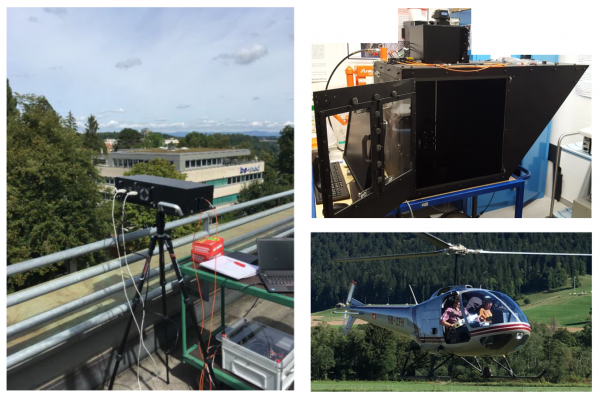Project 4.1: Characterisation of bio-markers using spectro-polarimetry
Project leaders: Brice-Olivier Demory and Antoine Pommerol (UniBE)
Key people: Jonas Kühn (Project Manager for MERMOZ), Lucas Patty (Postdoc)
The aim of Project 4.1 is to devise observational strategies for the detection and characterisation of living organisms on planetary surfaces using the spectral and polarimetric properties of light. We address this objective by performing laboratory measurements on well-characterised samples (WP1) and by assessing the feasibility of airborne and spaceborne instrumentation to use the terrestrial biosphere as a benchmark (WP2). During the first 1.5 years of this project, we mostly focused our activities on this second task (MERMOZ), supported by a number of laboratory investigations.
WP1. Significant progresses have been made in two directions:
– First, the POLICES (POLarization of ICES) instrument has been upgraded to allow us measuring circularly polarized reflectance spectra in better conditions. This includes the construction of a cooled sample holder to maintain icy samples at low temperature. Additional software has also been written to fully automate the spectral measurement and reduce the measurement time.
– Second, coordinated and occasionally simultaneous measurements between FlyPol (see WP2 below) and POLICES were acquired, which helps gaining confidence in the measurements and their interpretations as the two instruments are highly complementary. In particular, they use completely different approaches to separate the circular polarisation from the linear polarisation, which is by order of magnitudes higher. We have performed two extensive campaigns of lab measurements with a variety of biotic and abiotic samples. The measurements have shown the diversity of both the intensity and the shape of the spectro-polarimetric signatures of different types of plants. The reproducibility of data collected by both instruments is good and the shapes of the observed spectro-polarimetric features in good agreement. In addition to various leaves, we have also succeeded in measuring with both instruments a clear and strong circular polarization feature at the red-edge of the chlorophyll in a suspension of green unicellular algae.

Pictures of the different measurements setups used in this project. Left: the Flypol instrument operated on the roof of the University in Bern. Right, top: The POLICES instrument used for high-accuracy full-Stokes measurements in the Planetary Ice Lab. Right, bottom: Operation of the Flypol instrument from an helicopter in the Val-de-Travers
WP2 (MERMOZ).
The MERMOZ (Monitoring planEtary suRfaces with Modern pOlarimetric characteriZation) project aims at investigating whether we can identify and characterize Earth’s life from space, by building a benchmark library of surface feature signatures with remote full-Stokes spectro-polarimetry. In this framework, our planet is considered as a proxy for other solar system bodies, or even exoplanets, and the MERMOZ results are expected to inform the design of future large telescope polarimetric instruments that will targets these objects. Based on the positive outcome of the fall 2018 MERMOZ early feasibility study, validating the technology and experimental approach, we built a rugged, battery-powered tripod-mounted field-version circular spectro-polarimeter instrument called “FlyPol”. After a quick commissioning sequence in the summer 2019, we started outdoor field measurements with FlyPol in September of 2019. Targeting various remote scenes (trees, grass fields but also concrete walls or rooftops), we verified that we were able to remotely detect phototrophic organisms and reach the required precision (a few 10-4in circular polarization), with no “false positive” signals originating from artificial landscape. The FlyPol instrument showed remarkable reliability and ease of deployment, and was able to run for up to 8 hours in fully autonomous mode. After the successful field campaigns, we flew the FlyPol instrument on an helicopter in the Val-de-Travers area (NE) a few weeks later. On September 17th, 2019, for the first time, FlyPol performed its maiden flight and our team conducted airborne spectro-polarimetric ground observations over a 20 min-long flight, with the instrument being manually operated and aimed towards the ground by a team member. A comprehensive analysis of this dataset is currently underway. Preliminary results on a few remote scenes (forest area, “green” algae-rich mountain lake) already reveals compelling evidence of unambiguous circular polarization detections. Our airborne campaign validates the MERMOZ feasibility study main objectives and forms the foundations of the MERMOZ Space Mission. This mission will consist of an Earth orbital monitoring instrument occupying a nadir payload slot on the Airbus/Bartolomeo platform of the International Space Station (ISS). Capitalising on the successful FlyPol instrument, we are currently building “FlyPol+”, which is an upgrade including linear polarization capability. FlyPol+ will become the first airborne full Stokes spectro-polarimeter and will provide us with a deeper understanding of instrumental systematics.

